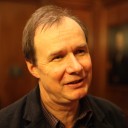![january_2011[1]](http://politicsinspires.org/wp-content/uploads/2011/01/january_201115-300x173.jpg) A year can be a very long time in the life of media interest. In December 2009, I was one of more than 4,000 journalists who attended the UN’s Copenhagen summit on climate change – probably the largest press presence for an international event outside of sport.
A year can be a very long time in the life of media interest. In December 2009, I was one of more than 4,000 journalists who attended the UN’s Copenhagen summit on climate change – probably the largest press presence for an international event outside of sport.
The journalists came from 119 countries, and suffered the freezing temperatures and disappointing results. It wasn’t just the Western press who were there. Emerging powers like Brazil and China both had more than 100 journalists. (see the RISJ report at http://reutersinstitute.politics.ox.ac.uk/publications/risj-challenges/summoned-by-science.html)
One year on, and the next major summit at the Mexican resort of Cancun was much less of an attraction – despite the beaches, tequila and abundance of sun. This time, around 1,200 of us made the trip, and many of these were from Mexico, the host nation, and Latin America. The numbers of British reporters dropped to around 50 from the 200-plus there were at Copenhagen.
The British print media were well represented, including – to many people’s surprise (or was it the tropical location?) – the Sun, the Mirror and the Mail. The great absentees were journalists for TV – no-one seems to have been there for BBC television, ITN or Sky. Indeed, the BBC delegation dropped from more than 60 in Copenhagen to 6 in Cancun.
The US media were the same. Major media outlets like the New York Times and the Washington Post had fewer reporters. The three main TV networks – CBS, ABC and NBC – had two journalists registered between them.
The result in the US was that Cancun hardly made the TV news. According to provisional research by Professor Robert Brulle at Drexel University, the coverage on the networks amounted to one 10-second clip. This contrasts with the 32 stories totalling 98 minutes generated by the Copenhagen talks. See http://wwwp.dailyclimate.org/tdc-newsroom/2011/01/climate-coverage
“I’m trying to check it again and again,” Brulle was quoted as saying. “It’s so little, it’s stunning.”
It is perhaps ironic that there was far less coverage of the Cancun meeting, when the end agreement, though modest, was nevertheless more significant than that reached at Copenhagen. http://www.bbc.co.uk/blogs/thereporters/richardblack/2010/12/cancun_the_chihuahua_that_roar.html
Some commentators are incensed by the general neglect of the climate change story: http://climateprogress.org/2011/01/03/media-coverage-fell-off-the-map-in-2010/
But there are plenty of reasons which explain the drop in interest at Cancun. Expectations were lower, far fewer heads of state were present (around 10 compared to 120 at Copenhagen), and editors and news consumers alike are suffering from climate fatigue.
Moreover, 2010 in general witnessed a significant decline in coverage of climate change around the world. The mapping carried out by Max Boykoff, formerly at Oxford University, and Maria Mansfield clearly shows the drop in most parts of the world – in some cases to pre-2007 levels.
![january_2011[1] http://politicsinspires.org/wp-content/uploads/2011/01/january_201115.jpg](http://politicsinspires.org/wp-content/uploads/2011/01/january_201115.jpg)
Analysis by dailyclimate.org concluded that ‘2010 was the year climate coverage fell off the map’. Its data base showed that the volume of coverage in English language publications dropped by 30 per cent to 2005 levels. Professor Brulle’s research shows that for the whole of 2010, TV coverage in the US was minimal.
The decline in media interest has prompted plenty of analysis for the reasons behind it and renewed debate about the relationship between volume of coverage and its effect on human attitudes and behaviour.
News organisations, particularly in the USA, are suffering budget cuts, whilst editors and environment journalists are searching for new angles and storylines to hook readers and viewers. At the end of our study, we made several suggestions as to what might improve the quality and quantity of climate change reporting. In particular it might help to frame the story in terms not so much of potentially devastating consequences in distant parts of the world, but in terms of more local impacts of the climate changing and what people are doing about it.
Certainly environmental groups are trying to reinvigorate interest in climate change, at a time when the general public in many Western countries is climate change-weary. Polls suggest that many have lost trust in climate scientists in part due to the UEA email affair. A recent article in Der Spiegel suggested several new approaches including Sex, Emotion and a new Messiah. http://www.spiegel.de/international/world/0,1518,737451,00.html
James Painter is the head of the journalism fellowship programme at the Reuters Institute for the Study of Journalism, and is author of a recent RISJ study on climate change and the media, called ‘Summoned by Science’. He sent reports from Cancun for the BBC Spanish website, bbcmundo.com.







No Comment